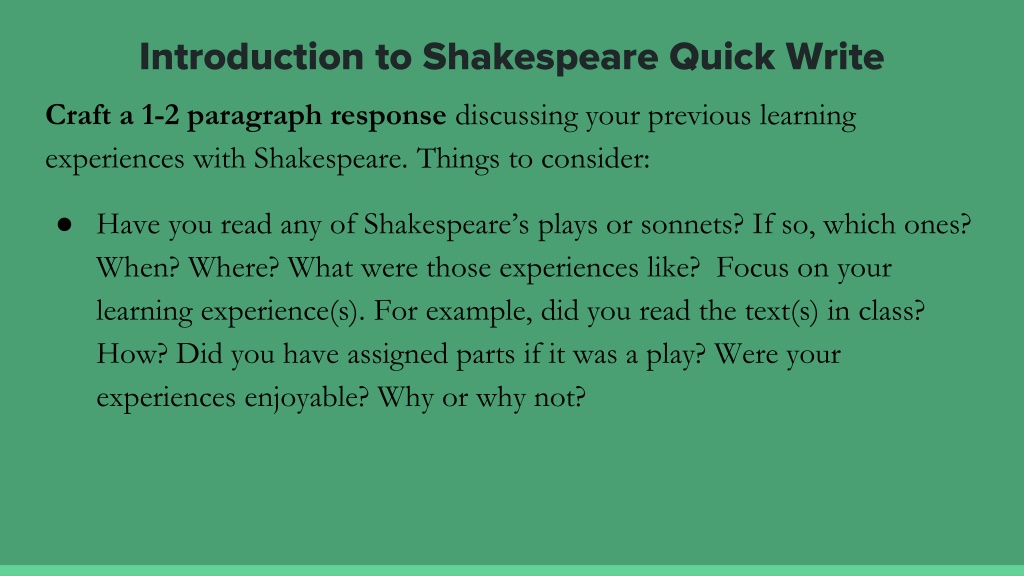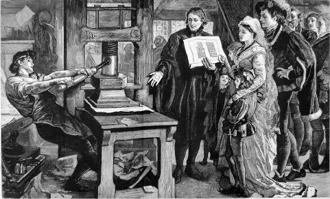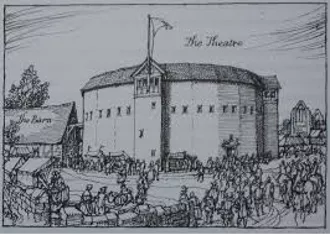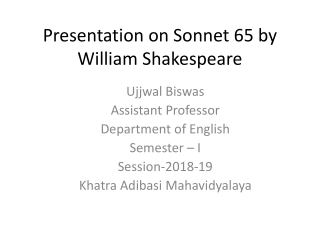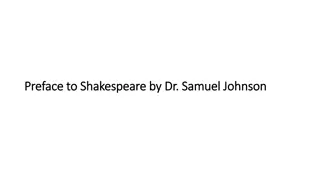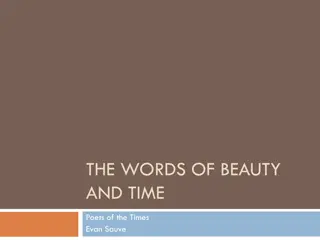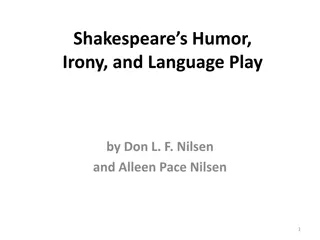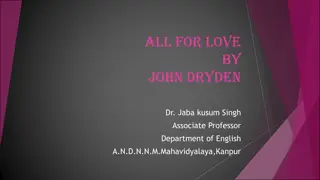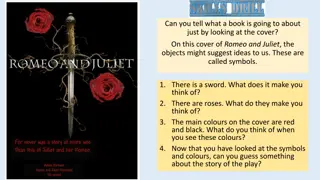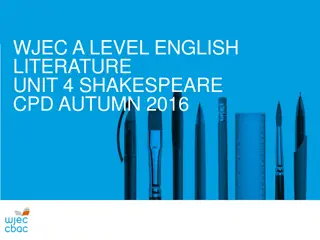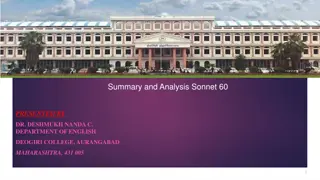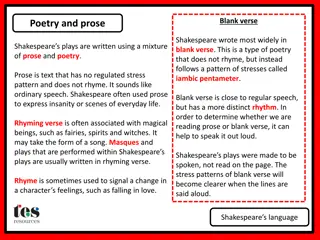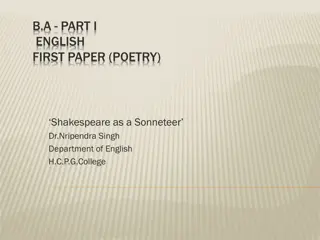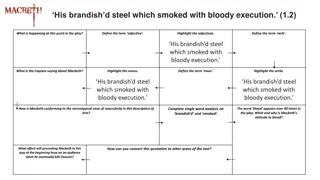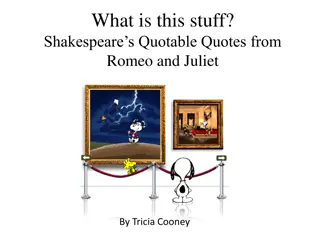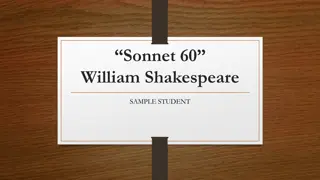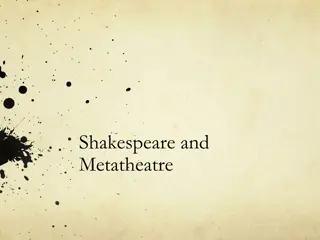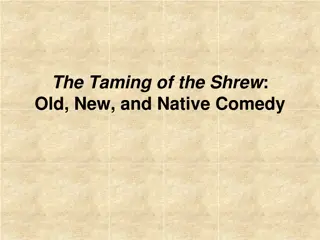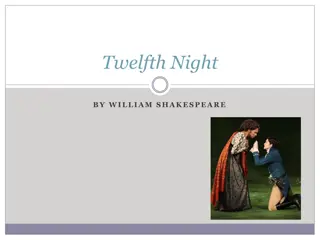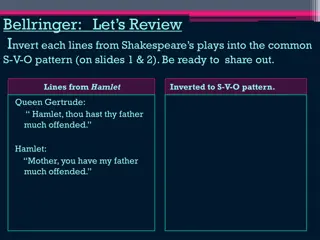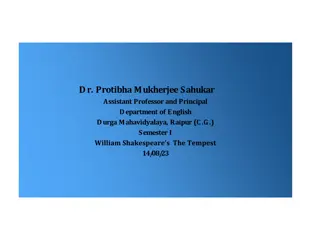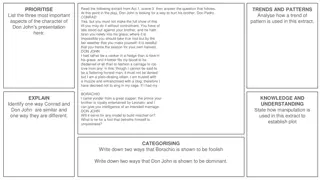Shakespeare Learning Experiences
Having engaged with Shakespeare's works in the past, I have read several of his plays and sonnets, such as Hamlet and Sonnet 18, during my high school literature classes. Our teacher assigned us different parts to read aloud, allowing us to immerse ourselves in the language and themes of Shakespeare. While challenging at first, diving into the intricate plots and beautiful verse was ultimately rewarding and expanded my appreciation for classical literature.
Download Presentation

Please find below an Image/Link to download the presentation.
The content on the website is provided AS IS for your information and personal use only. It may not be sold, licensed, or shared on other websites without obtaining consent from the author.If you encounter any issues during the download, it is possible that the publisher has removed the file from their server.
You are allowed to download the files provided on this website for personal or commercial use, subject to the condition that they are used lawfully. All files are the property of their respective owners.
The content on the website is provided AS IS for your information and personal use only. It may not be sold, licensed, or shared on other websites without obtaining consent from the author.
E N D
Presentation Transcript
Introduction to Shakespeare Quick Write Craft a 1-2 paragraph response discussing your previous learning experiences with Shakespeare. Things to consider: Have you read any of Shakespeare s plays or sonnets? If so, which ones? When? Where? What were those experiences like? Focus on your learning experience(s). For example, did you read the text(s) in class? How? Did you have assigned parts if it was a play? Were your experiences enjoyable? Why or why not?
Important Dates 1485: 1485: medieval period ends; Renaissance begins Battle of Bosworth Field (last medieval king--Richard III of the house of Plantagenet-- killed by first Renaissance king--Henry VII of the house of Tudor) William Caxton brings first printing press to England, making information more accessible Called Renaissance (rebirth) because there is a rebirth of knowledge-- rediscovering past they didn t know about, other cultures 1564: 1564: Shakespeare s baptism 1576 1576
Shakespeares Education Start in morning, read Latin, translate it into English, translate it back into Latin If started with prose piece, turn it into poetry; if started with poetry, turn it into drama Teaching about LANGUAGE, so the perfect education if you want to be a playwright No professional writers until late 16th century, coalesces in 1576 with need for plays Didn t have access to Greek dramatists, but did have ROMAN dramatists Domestic comedies: boy meets girl, wants to marry her but can t because of her family, or because she doesn t have enough money, etc. BUT there s
Shakespeares Start So if you re trying to be a playwright in 1580s London coming from small market town of Stratford-upon-Avon, how do you become a playwright? Small jobs around playhouse Working on others plays Recycling other people s ideas and models you know from school First comedy: Comedy of Errors (1592-1593) First tragedy: Titus Andronicus (1593 1594)
Shakespeares Theater Outside, performed in daytime (no other lighting) Created more interaction and involvement between actors and audience Limited set; relied on costumes, props, and descriptive language All male actors (younger boys played female parts until around 1660) Church did not like playhouses, so built outside city walls Affordable: cheapest seats 1 pence, but had to stand (groundlings) Most important aspect was to HEAR the play, so more expensive seats were ones that had best sound
Various London Theaters Theatre (1576) built by James Burbage; located in Shoreditch, north-east of City of London; dismantled in 1599 and rebuilt as Globe Curtain (1577); built just south of Theatre; used up until 1620s Rose (1587) built by Philip Henslowe; south of River Thames on Bankside; demolished in 1606 Swan (1595) competitor to Rose; closed by government order in 1597 Globe (1599); first burnt in 1613; second given tiled roof Fortune (1600); built by Henslowe; burnt down in 1621, but was rebuilt; demolished in 1661 Blackfriars (1608); purchased by Burbage in 1596, but used by LCM from
15 Minute Othello Rehearse your lines: What is the tone of the lines? What word(s) will you stress? Afterwards: What are possible theme topics of the play you might predict based upon this exercise?
